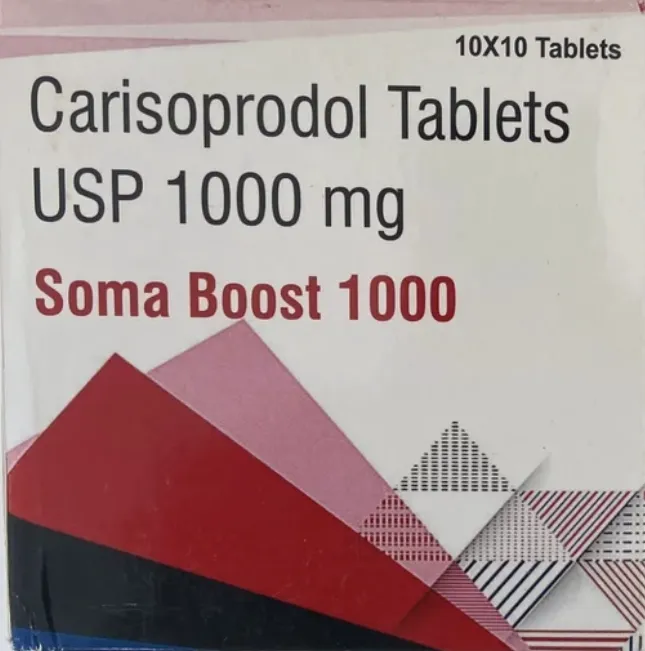Description
Carisoprodol 1000 mg.
Indications
Carisoprodol 1000 mg is a centrally acting skeletal muscle relaxant indicated for the relief of discomfort associated with acute, painful musculoskeletal conditions such as muscle spasm, strain, or sprain. It is prescribed for short-term use as part of a comprehensive treatment plan that includes rest and physical therapy. Carisoprodol helps alleviate muscle tension and pain by reducing the neurological signals that cause involuntary muscle contractions.
Mechanism of Action
Carisoprodol acts primarily on the central nervous system rather than directly on skeletal muscles. It interrupts neuronal communication within the reticular formation and spinal cord, leading to sedation and alteration in pain perception. Its major metabolite, meprobamate, contributes to its therapeutic effects through anxiolytic and sedative actions, providing an overall calming effect on the neuromuscular system. This dual action reduces muscle hyperactivity and relieves pain associated with acute musculoskeletal conditions.
Pharmacological Properties
Absorption and Distribution: Carisoprodol is rapidly absorbed after oral administration, reaching peak plasma concentrations within 1–2 hours. It exhibits moderate protein binding and distributes widely in body tissues.
Metabolism: The drug undergoes hepatic metabolism primarily via the CYP2C19 enzyme to form meprobamate, which has a longer half-life and contributes to sustained sedative effects.
Elimination: Carisoprodol has an elimination half-life of approximately 2 hours, while meprobamate’s half-life ranges from 6 to 17 hours. Both compounds are excreted mainly through the kidneys.
Pharmacodynamics: The pharmacological effects are dose-dependent. Excessive doses may result in profound CNS depression and should be avoided.
Contraindications
Carisoprodol is contraindicated in individuals with hypersensitivity to carisoprodol, meprobamate, or other carbamates. It should not be administered to patients with a history of acute intermittent porphyria or those with a history of drug abuse, dependence, or addiction. Use is also contraindicated during pregnancy and lactation unless deemed absolutely necessary by a healthcare professional.
Side Effects
Common side effects include drowsiness, dizziness, and headache. Some patients may experience nausea, vomiting, or dry mouth. Rare but serious reactions include hypotension, tachycardia, and allergic skin reactions. Prolonged use or high doses can lead to dependence due to the sedative nature of meprobamate. Abrupt discontinuation after long-term use may cause withdrawal symptoms such as insomnia, anxiety, or tremors. Patients are advised to avoid alcohol and other CNS depressants while taking Carisoprodol.
Dosage and Administration
Carisoprodol 1000 mg should be used strictly according to medical supervision. The dosage and duration depend on the severity of symptoms and patient tolerance. Typically, therapy is limited to short-term courses of 2–3 weeks, as there is insufficient evidence of effectiveness with prolonged use. It is recommended to take the medication with water and avoid operating machinery or driving while under its influence.
Interactions
Concomitant use with alcohol, benzodiazepines, opioids, or other CNS depressants may potentiate sedative effects and increase the risk of respiratory depression. CYP2C19 inhibitors (such as omeprazole and fluvoxamine) may elevate plasma levels of carisoprodol, while inducers (such as rifampicin) may reduce its efficacy. Careful monitoring and dose adjustments may be required in such cases.
Precautions
Use with caution in patients with hepatic or renal impairment, as drug metabolism and clearance may be reduced. Patients should be informed about the potential for dependence and withdrawal. Carisoprodol should not be shared with others, especially those with a history of substance misuse. The drug may cause sedation and impair coordination, thus caution is advised when performing tasks requiring alertness.
Clinical Studies
Clinical trials have demonstrated the efficacy of Carisoprodol in reducing pain and improving mobility in patients with acute musculoskeletal conditions. Studies comparing Carisoprodol to placebo showed significant improvement in muscle relaxation and reduction of pain scores. However, its benefits are most pronounced in short-term use, and extended administration increases the risk of dependence. These findings underscore the importance of controlled, time-limited therapy.
Conclusion
Carisoprodol 1000 mg is an effective skeletal muscle relaxant used for the short-term management of musculoskeletal pain and spasm. Its dual mechanism—CNS depression and conversion to meprobamate—provides relief but necessitates cautious use due to potential sedative and dependence-related risks. Under medical supervision, it remains a valuable option for acute muscle pain when combined with rest, physiotherapy, and patient education.
Important
Carisoprodol should be used responsibly and only under the direction of a licensed healthcare professional. Patients should adhere to prescribed dosages, avoid alcohol or sedatives, and promptly report any unusual symptoms or signs of dependence.

